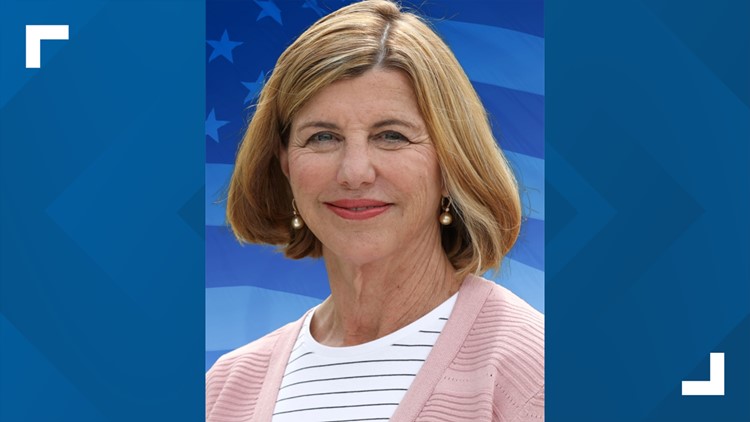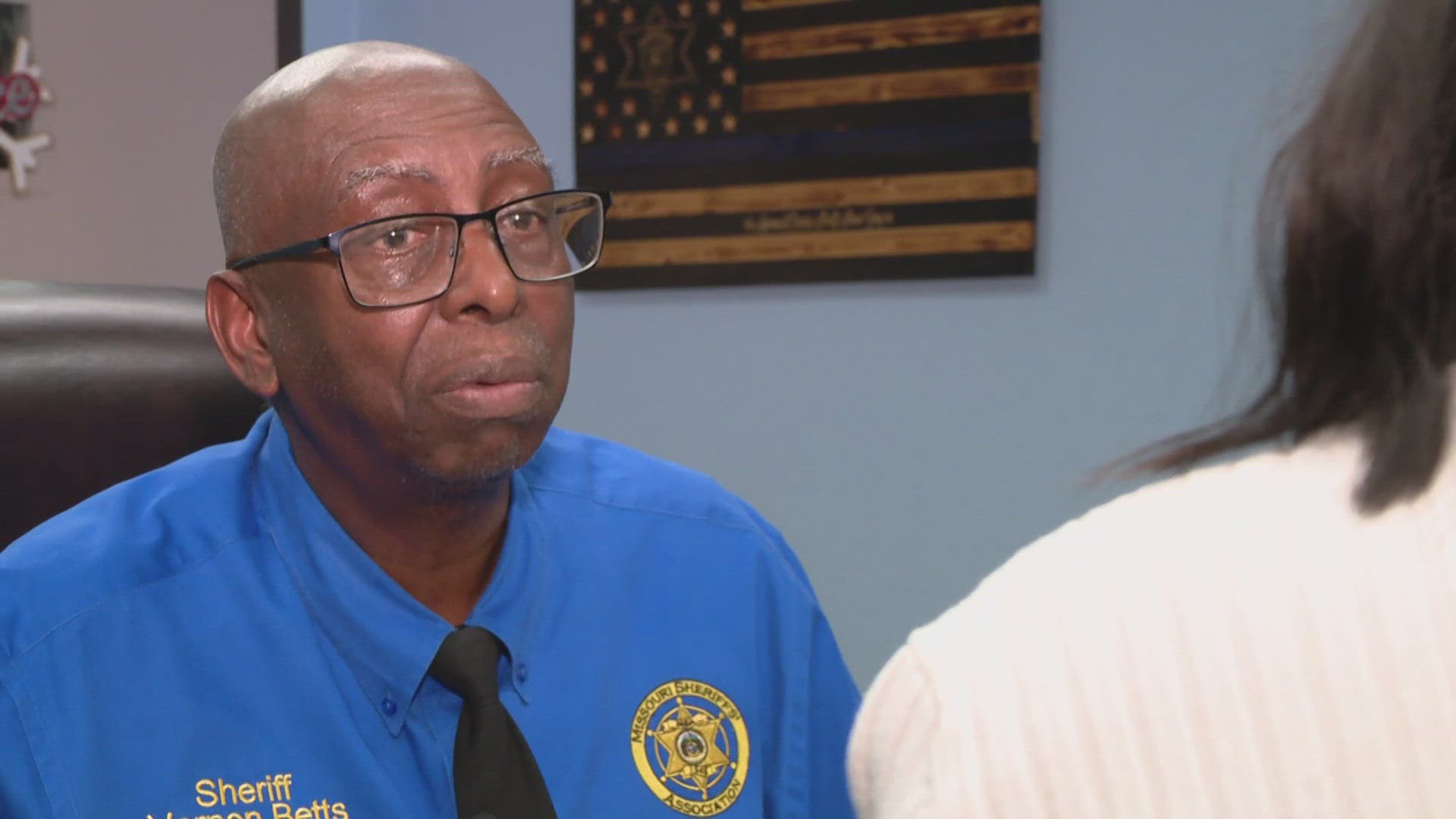ST. LOUIS — Trudy Busch Valentine is a Democratic candidate for U.S. Senate in Missouri. The primary is August 2. One Democrat will go on to face candidates of other parties in the general election in November.
A multi-millionaire heiress to a portion of the Anheuser Busch fortune, Trudy Busch Valentine set out to carve out a legacy of her own in her first bid for elected office.
KNOW TO VOTE: Missouri primary 2022: Voter guide for St. Louis area
A nurse by trade, Valentine talks to voters about the personal grief she experienced in life as she sells a softer side of politics, a salve for the blistering attacks and stinging rhetoric that has defined our modern era of campaigning.
Her inheritance has proven to be an asset and a liability. With great piles of money comes scrutiny, including questions about her 1977 involvement in an exclusively white ‘Veiled Prophet’ ball. Valentine apologized for her participation in the event which occurred when she was 19 years old, and more than a decade after the peak of the civil rights movement.
Valentine has highlighted her place as the only woman in the Democratic primary race and says she would be uniquely positioned to debate abortion rights in a general election matchup against an anti-abortion Republican nominee.
5 On Your Side candidate survey
To the extent any single member of Congress can influence the U.S. economy and labor market, what immediate steps would you take to reduce the cost of living burden Missourians face during this period of inflation?
Busch Valentine: I know it's a tough time for Missourians. We have record inflation. We have supply chain issues. We just come out of a big pandemic and two in three families are living paycheck to paycheck. And that's really tough. They're on the verge of being taken out of their homes. So we have to do something. We have to lower the cost of the basic necessities. We locally are seeing gas prices going on, but still food and groceries and housing and apartment rentals are high.
And do I know exactly how we will bring down those prices? I don't. But I know we need to and I know we need to help people that are going through the tough times now and that are barely making it by. I think in the long run, we need more manufacturing jobs in Missouri. We need more businesses to bring in more to bring people back into the state. We need really good paying jobs. We need a strong middle class that makes good wages, gets great insurance and other benefits. And that also has time to be with their families and can send their kids to college if they want to and live the American dream. I think that's really important for Missouri.
Missouri state law prohibits women and girls from seeking abortion procedures at any time during their pregnancy, regardless of circumstances involving rape, incest, or other unwanted or unplanned pregnancies. Would you support a similar law at the federal level? If not, then which women or girls should be allowed access to safe, legal abortion procedures?
Busch Valentine: That young women or women, period, cannot have access to abortion through incest or rape or sexual assault is something that I can hardly believe. And I support abortion for all women. I believe in the intelligence, the autonomy, the independence of women to make that choice for themselves. And that choice is between a woman and her doctor and not between a politician or the government.
What specific policies or practices would you support from Congress that could directly improve safety and reduce violent crime in Missouri?
Busch Valentine: I think fighting crime is a big issue, but I think we also have to separate nonviolent crime because it's two different pronged approach. And for nonviolent crime, I think people that are going in with addictions need help and support. I think people who are there because of poverty and hopelessness also need support. And I think we have to do more on educating people in the prison system. But for violent crime in any way of abuse, of hurting another person, hurting innocent victims, those are horrible abuses and they need to be in jail for those kinds of things. Without a doubt, they need to be held accountable. But was your question asking how to reduce it?
5 On Your Side Political Editor Mark Maxwell: Yes
Busch Valentine: And I think to reduce violent crime, we have to get guns off the street. And I think the violent crimes that have been committed in schools and in grocery stores and in parades and in movie theaters, it's insanity. What has gone on with military assault rifles. And innocent people are being killed over and over again. And we haven't done anything to really help stop it. Luckily, we've had bipartisan, bipartisan support on some of these red flag laws.
But I don't think we're doing enough. I think we have to do more. Definitely, no 18, 19 or 20-year-olds should be able to buy a military assault rifle. I don't think we need military assault rifles sold at all.
But I do believe that Missouri Missourians want to hunt and I don't want to take that away from them. But when my children were hunting and learning how to hunt, they went through a gun safety class and they went out with their dad and they hunted and they knew how to be careful with a gun. They knew how dangerous guns were. In our home, we lock up guns. We never left guns out. We never left guns loaded. And a lot of this crime and violence is happening because little kids are getting their hands on guns. There's not a neighborhood that I've gone through anywhere through Missouri that doesn't want to stop the crime rate in their neighborhoods.
It's hurting everybody. We have to get better ways for kids to be able to do things after school, to get into programs to concentrate more on their studies, because education is the only way to get people out of poverty.
What do you perceive as the single greatest threat to American democracy and how would you address it in Congress?
Busch Valentine: The greatest threat to our democracy is an inability or threatening of our voting rights because we are a democracy, because people can vote. And if we lose that, who are we? It is so important for people to get out and vote. Republicans are trying to block people from voting. Minorities. Elders, people with disabilities, all people need to be able to vote. And I fully support the John Lewis Voting Rights Act.
To what extent do fossil fuels contribute to the changing climate? To what extent should Congressional action attempt to alter that trajectory?
Busch Valentine: I think fossil fuels have contributed greatly to climate change and to a warming earth and to all the fires that we see, the droughts, we see the floods, we see the high temperatures, we see. It's all over the world is not just in America. And we have to decrease our use of gas and all the other things that we're doing. And we have to get back to a more sustainable energy and sustainable energy to me. And what we use at our farm is solar energy. And there's good sources now for solar energy. It can lower the price that you're paying to heat and cool your home and to have electricity. It also is a whole different area to get people back to work and get more jobs in the market. I believe we have to protect our common home and I see climate change and what is going on throughout the world is a crisis in health care.
Public polling shows most Americans believe the U.S. Supreme Court has become too political. What reforms, if any, should Congress take to reshape or reimagine the makeup or behavior of the court?
Busch Valentine: Big question. And I don't know if we've come up with one really good answer yet. There are a lot of different thoughts on it, but I believe that we couldn't hear from the Supreme Court justice that was asked to was asked by President Obama to be in the running, that we couldn't hear from him that whole year because of political division was completely wrong. I think that we need to always listen, especially in Congress, to the people that are coming through, that are running for Supreme Court positions and that they are under oath to tell the truth. And that means if three Supreme Court justices said they would not overturn Roe v Wade because it's been in the history books for too long, and then they did. I think there's accountability for that.
Maxwell: Are there any specifics in there that people want to watch the Senate race closely to see how the Senate especially might influence the makeup of the court? Just a follow up question on that. Have you considered expanding the size of the court, abolishing the filibuster to reshape or?
Busch Valentine: Yeah, I think right now in the Senate with a Democratic majority, we absolutely need to stop the filibuster. It's over. It's done with. All it is done is block any kind of policies from becoming laws. And right now, we should codify Roe v Wade and forget the filibuster for ever. It's not working.
Which Constitutional amendment is your favorite and why?
Busch Valentine: I could say the 21st because prohibition ended, but I won't say that. I'll say the 19th Amendment because it gave women the right to vote. And if that didn't happen, I wouldn't be sitting here today.
What is your favorite movie, most influential book, and go-to genre of music?
Busch Valentine: For a movie. I love Legends of the Fall. And I think our whole family has watched that so often together. One of my all time favorite books was No Error, No Ordinary Time by Doris Kearns Goodwin. It was about Franklin and Eleanor Roosevelt during World War II and how that whole era affected their lives and what they did during that time for our country. Really interesting book. And if I had time to listen to some music, I would put on James Taylor and I and other people like James Taylor.



